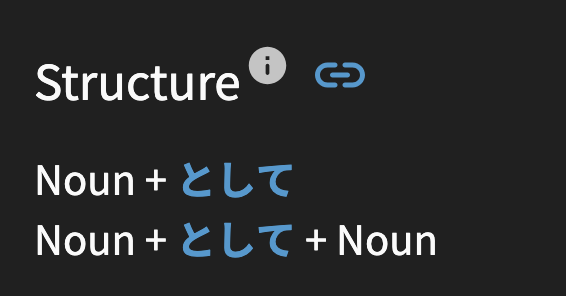English translation:
as (i.e. in the role of)
Structure:
Noun + として
Noun1 + として + の + Noun2

English translation:
as (i.e. in the role of)
Structure:
Noun + として
Noun1 + として + の + Noun2
This sentence’s grammar confuses me:
文法は日本語の一番難しい ところ として 、学ぶ方法がなかなか見つからない。
This sentence showed up on the page for として, but the ところ part is confusing. When I search ところ, all the entries except for one use a verb in front of ところ, and they generally have a meaning like “just about to”, which doesn’t make sense here. The entry for ところに allows an adjective, for the meaning of “at the time / when / while”, which also doesn’t make sense here. There’s also the simple translation of “place”, but then it’s some “place” in our minds?
Is ところ functioning as a nominalizer for this adjective? Which ところ grammar point does that fall under? Would it be the same to say 一番難しいこととして?
Thank you in advance. 
@FredKore Hey! ところ is just functioning as a noun, meaning “place,” “area,” “facet,” or in this case, “aspect.” So, 難しいところ is just referring to grammar as a “difficult aspect (of Japanese).” Cheers!
This example gave me a question:
マルボルク城は中世で最大の城の一つとして知られている。
The way this is translated makes this seem as though a だと could be used instead of として, based on the ~と考えられている and ~と言われている grammar points. Is that not the case for 知る?
だと can also be used here, but として feels more natural.
The difference is minimal, as in English:
The castle Malbork is known as (in the role of, refers to the function) one of the biggest castles from the Middle Ages.
vs
The castle Malbork is known to be one of the biggest castles from the Middle Ages.
The use of の after として confuses me. as in 私たちは先生としての彼を尊敬します。Why is it there, and how can として take possession of something, seeing as it is also considered a particle. shouldn’t it 私の先生として彼を尊敬します to mean “As our teacher” “We respect him as our teacher”. Is there something I’m missing or just isn’t explained here?
“As our teacher, he/she respects him” (your teacher is the one doing the respecting to him)
“We respect him as a teacher” (We, him as a teacher, we respect)
The first one implies the teacher is the topicは and is doing the respecting to whoever “he” is.
The second connects “as a teacher” to “him” with the の making “him as a teacher”
how I see it. I can’t explain to you why tho, just the differences I can see between the two. Hopefully someone more knowledgeable can help you know why
Here its making a connection with の, rather than just possession. Here’s it’s grammar point
I was confused by 「私たちは先生としての彼を尊敬します。」 too. This is my analysis (but I’m not sure if I have it right):
If it were just 「私たちは先生として彼を尊敬します。」, the most natural interpretation would be:
私たちは We…
先生として as teachers…
彼を尊敬します。We, as teachers, respect him.
I’m not sure if more context could force a different interpretation or not.
Adding the の changes the structure:
私たちは We…
先生としての彼を Him as a teacher…
尊敬します。We respect him as a teacher.
In this case, basically the の removes any ambiguity about who the teacher is.
私たちは先生として彼を尊敬します。
In this sentence you could not 100% say whether the teacher/s are 私たち or 彼.
私たちは先生としての彼を尊敬します。
In this case, の changes the previous clause to ‘him as a teacher’, making it so there is no longer any confusion.
This の is stating the role of the person it precedes.
Please be mindful that the top of the page does not report the use of の between the two nouns, as indicated at the top of this discussion (and shown in several examples):
